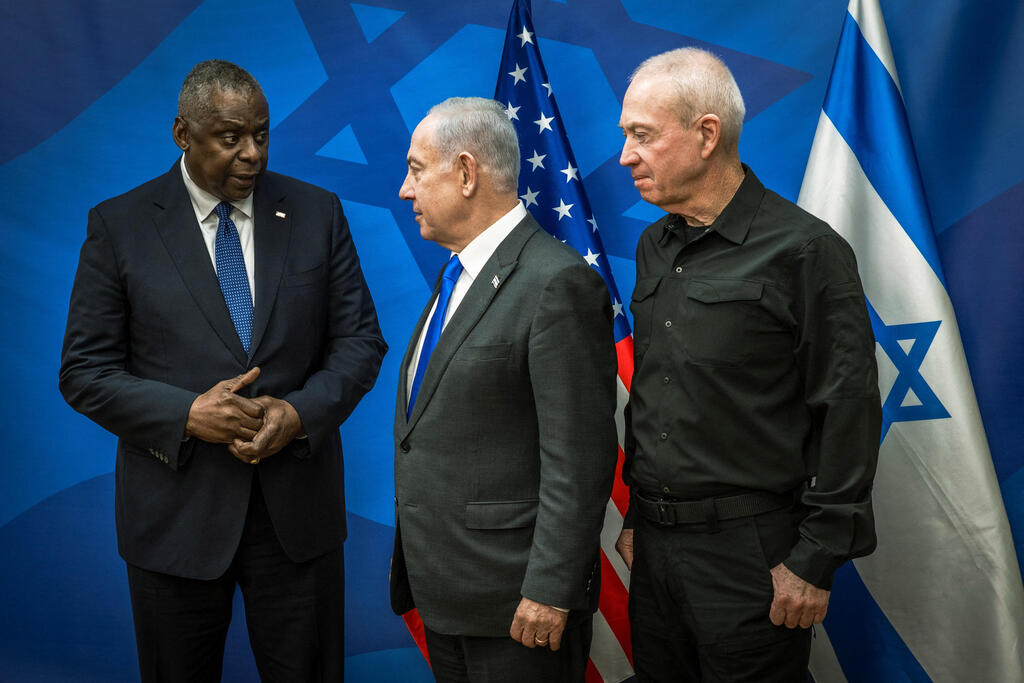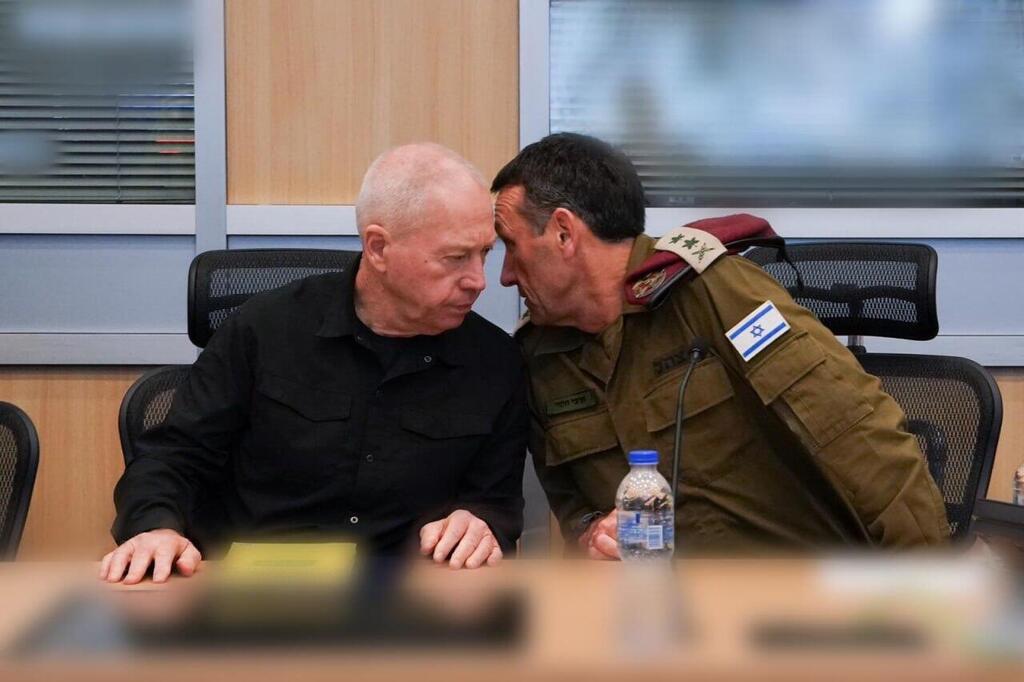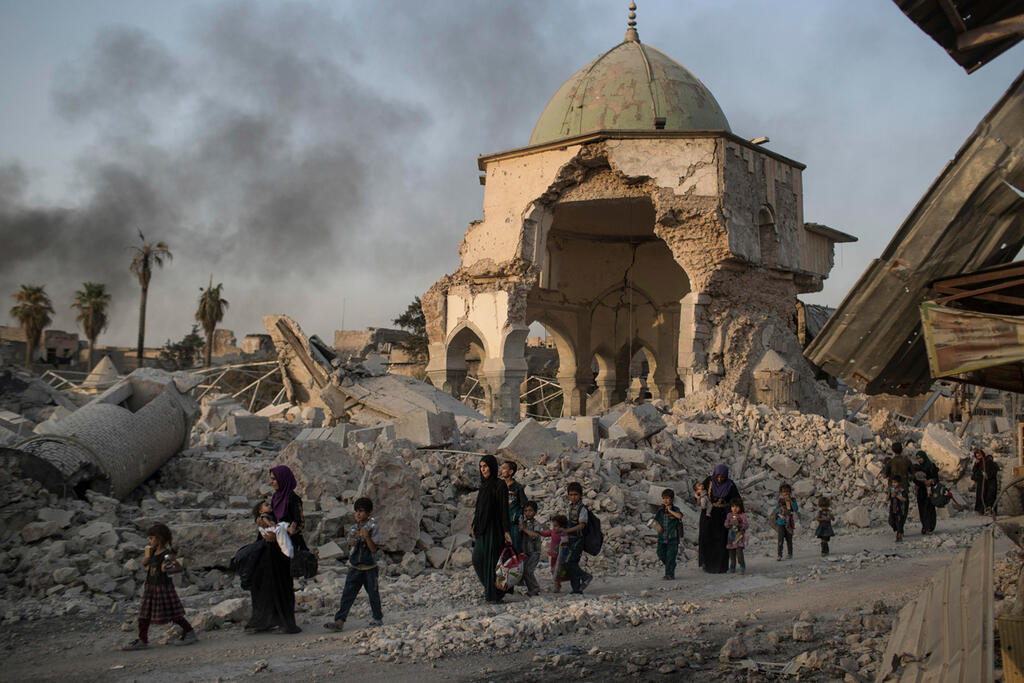Getting your Trinity Audio player ready...
Since Friday evening, the IDF has launched a ground operation in northern Gaza. Reports from Palestinian outlets and Arab media suggest that the IDF is concentrating on the outskirts of the northern Gaza Strip, particularly the suburbs of Gaza City, rather than its core regions. This phased operation sees the IDF entering and possibly exiting, only to return with reinforced troops based on the evolving objectives and challenges encountered during the operation in Gaza.
Read more:
This type of operation is characteristic of a war in which forces move across enemy territory, employing fire attacks throughout. The direction of action and immediate operational goals change based on intelligence provided by the Shin Bet and the IDF Intelligence Division.
IDF Tanks venturing inside Gaza
(Video: IDF Spokesperson's Unit)
The strategic objectives set forth by Minister of Defense Yoav Gallant and IDF Chief of Staff Herzi Halevy have remained unchanged within the tactical realm. These objectives are being pursued with unwavering determination, with the aim of undermining Hamas's control and completely dismantling its military capabilities. The utmost priority at this time is to secure the release of the captives.
The current operational approach is modular in nature, designed to gradually increase pressure on Hamas's extremist leadership. This pressure is intended to compel not only Hamas but also those holding the captives to engage in comprehensive negotiations for their release.
The entry of large Israeli forces into the territory poses a significant threat that will inevitably force Hamas and Islamic Jihad to scale back their manipulative tactics and psychological warfare, which they have employed against Israel over the past three weeks. The issue of captives has been exploited by Hamas not only to secure the release of Palestinian security prisoners and obtain fuel but also to impede the IDF's ground maneuverability into the Strip and undermine Israeli control.
Hamas's conduct in Gaza, Lebanon, and Qatar has been focused on manipulating international pressure to prevent any ground incursion by Israel. Within Israel, there is a growing recognition that negotiations or simple bargaining with Hamas will not yield satisfactory results. Consequently, the decision has been made to carry out an operation that will exert additional physical pressure on Hamas within Gaza, with the ultimate goal of securing the release of the captives.
In this context, a dilemma arises between those who argue against endangering the lives of the captives and advocate for negotiations with Hamas without involving the IDF in the Strip. On the other hand, there is a perspective that without the additional pressure generated by the ground maneuver into the Strip, Hamas will not release the Israeli captives, including children, women, and the elderly, who represent the only remaining political and effective leverage in their hands.
According to reliable reports in The Washington Post, President Biden and Pentagon officials have been pressuring Israel, specifically the progressive-liberal wing of the Democratic Party, to carry out surgical operations using pinpoint strikes and aerial actions, similar to what the Americans did in Mosul, Iraq, to liberate it from ISIS between 2016-2017.
However, this pressure is unfair and unjustified because while the Americans in Mosul did indeed operate with pinpoint strikes and aerial bombardment, they also had Iraqi special forces, Kurdish militias, and Shiite militias loyal to Iran operating on the ground, carrying out the pressure and clearing the area, including the tunnels.
The IDF does not have the luxury of dispatching Kurdish or Iraqi Shiite militias to assist in ground operations in Gaza. While the Israeli air force and artillery are attacking Gaza from the air and ground, the IDF needs to carry out ground operations alone. Therefore, the American pressure is considered unfair by the Israeli leadership.
In order for Netanyahu and Gallant to be convinced that delaying the ground operation may lead to undesirable consequences, including due to the American pressure that may not materialize, it would likely be necessary for Israel to completely dismantle Hamas's leadership and military capabilities.
The decision to initiate the operation was influenced by several factors. One of these factors stemmed from the perceived state of Hamas, which was riding high on a wave of confidence and exuberance. Notably, they projected an air of self-assurance not only internally but also to the broader Arab world. Hamas conveyed the belief that Israel was apprehensive about launching an attack on Gaza.
Their confidence was bolstered by the successful elimination of Gaza brigade commanders who had knowledge of potential ground maneuvers by the Israeli Defense Forces (IDF). In addition, Hamas asserted that Israel lacked an effective military response to the threat posed by drones and UAVs operated by Gazans, which could target Israeli tanks from above. According to Hamas, this perceived vulnerability of Israel played into their narrative of victory, a message that resonated widely across the Arab world, thereby undermining Israeli deterrence.
This intoxicating narrative, if left unchecked, was feared to have significant repercussions. There was a growing concern that if Hamas continued to broadcast this narrative and Israel refrained from entering the Gaza Strip, it might embolden Iran and Hezbollah. These groups might interpret Israel's hesitancy as an opportunity to attack, especially when the IDF and its political leadership appeared reluctant to engage in conflict.
Hamas, fueled by this euphoria, presented three primary demands to Israel. First, they called for an indefinite ceasefire. Second, they insisted on the release of all Palestinian prisoners held in Israeli penitentiaries. Lastly, they requested the provision of fuel to Gaza, essential for maintaining their network of tunnels and the underground metro they had constructed in the Strip, which served as a critical element for their ongoing military operations. In return, Hamas indicated a willingness to release foreign civilians and, possibly, children, women, and the elderly. However, when Israel signaled its willingness to consider some of these demands through Qatari and Egyptian intermediaries, Hamas interpreted it as a sign of Israeli capitulation due to the hostages and subsequently toughened their terms.
In the midst of these ongoing developments, there is just one strategy remaining for implementing the modular plan, which has been consistently updated and is now in the process of execution. Notably, the pressure from the United States persists. Last night, shortly after the IDF commenced a significant ground operation within the confines of the Gaza Strip, U.S. Defense Secretary Lloyd Austin reached out to Defense Minister Gallant.
His purpose was to gain a better understanding of Israel's actions. After being provided with a broad overview of the operation's objectives, the defense secretary expressed the importance of minimizing harm to innocent individuals and civilians, as well as increasing the amount of humanitarian assistance permitted into the Gaza Strip by Israel. In response, it has been reported by foreign sources that Minister Gallant conveyed his general agreement with both of these requests.
At the same time, President Biden appealed to Congress to authorize the use of U.S. forces to repel attacks by Iran and its proxies on U.S. troops and facilities in the Middle East. Biden requested because the War Powers Act required congressional authorization for the continued deployment of U.S. forces engaged as part of a potential military operation. The U.S. recently responded to attacks on its bases in Syria and Iraq by leveling Iranian Revolutionary Guard ammunition depots in Abu Kamal on the Syria-Iraq border. The strike was an extremely measured response designed to avoid escalating tensions with Iran.
3 View gallery


US Secretary of Defense Lloyd Austin With PM Netanyahu and Defense Minister Yoav Gallant
(Photo: Chad McNeeley/Office of the Secretary of Defense Public Affairs/Handout via REUTERS)
Biden's request to Congress seeks to provide clearer legal authorization for further U.S. military action in the Middle East in response to Iranian proxies like Hezbollah and militias in Iraq. The broader goal is to deter further Iranian attacks on U.S. troops and allies while avoiding a wider conflict. The limited airstrike against Iranian military targets indicates Biden's preference for a cautious approach to containing Iranian influence without triggering an all-out war. Congressional approval of Biden's request would strengthen his hand in responding to Iranian aggression, while still placing limits on the potential scale and duration of U.S. military operations.
As Israeli citizens, we must understand that the upcoming actions taken by the IDF in the days and weeks ahead may appear perplexing at times, potentially exposing both our hostages and our soldiers operating within the Gaza Strip to avoidable risks. It is imperative to grasp one fundamental principle during this current phase: the safety and eventual return home of all the hostages are among our foremost priorities.
Every action undertaken by the IDF hinges on the high-quality intelligence furnished by the Shin Bet and the IDF's Intelligence Directorate. Additionally, it takes into account the operational assessments of on-site commanders and the decisions made by the limited war cabinet. After having personally observed the battlefield and engaged in discussions with key decision-makers, I can confidently attest to their ability to prudently steer this conflict. They are resolute in their approach, while also displaying immense consideration for the well-being of both the hostages and the soldiers currently engaged in operations within the Gaza Strip.







